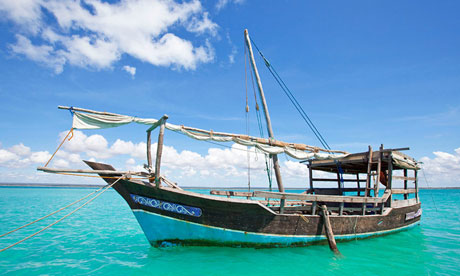
Crawling out of a comfortable bed in the pitch-black isn't many people's idea of the perfect holiday experience. Then again, a 2.30am wake-up call on a beach on Arimba, one of the Quirimbas islands, is about as far from an ordinary hotel routine as one can get.
With our day's transport, a sturdy dhow fashioned from Tanzanian teak, just visible offshore, my guide Causemore Dzvene hands over a cup of coffee. The crew of the dhow are already beginning to dismantle the luxury camp they erected for me on the sand three days earlier; my modern dome tent, the shower cubicle, canvas dining marquee and its outsized deck chairs. I stand beside a driftwood fire, flames fanned by the Indian Ocean breeze, transfixed by the glorious canopy of stars overhead. High on caffeine, shooting stars streaking earthward, I've rarely felt so alive after only four hours' sleep.
We're up this early to catch the tide. Yesterday, at low ebb, the distant sea was a shimmering turquoise line, trapped between foreshore and sky, stranding our dhow on the littoral mud. Now it swashes the nearby mangrove trees and the dhow bucks and strains at its anchor below a bright sliver of moon.
By torchlight Dzvene and his retinue of assistants have soon collapsed the camp into an unfeasibly small number of plastic crates. A wooden dinghy ferries me toward the square stern of Vagabundo, our dhow. An arm extends from the gloom and I scramble aboard. It's time to go island-hopping.
Hugging the Mozambique coast, the Quirimbas archipelago's clutch of 32 pristine coral islands and islets is a Unesco world heritage site stretching for 320km up to the Tanzanian border.
Vagabundo is the property of Ibo Island Lodge, a boutique, colonial-style hotel which opened on the island of Ibo, in 2006. Strategically located at the heart of the Quirimbas, for centuries Ibo Island was one of the most prosperous trading posts in this corner of the world. Three forts, a Catholic church and a grand array of dilapidated villas still pay testament to its commercial heyday at the turn of the 19th century. Pirates, ivory and slavery are all part of the island's colourful history.
Given that history, it's hard to imagine a more fitting way to explore its aquatic backyard than by a vessel whose design has changed little over the last thousand or so years. Ibo fishermen still navigate the channels in dhows made from mangrove wood, ropes of coconut husk, a handful of nails and triangular sails sewn together from plastic sacks.
"The great fun of island-hopping by dhow is that our guests get to decide where they want to go," says South African lodge manager Rob McKenzie. "Each dhow can handle up to 10 passengers. They camp beside a beach, dine on seafood caught hours before, and go kayaking, snorkelling and nature walking. If they want to move, the crew simply packs up camp and they sail somewhere else."
"It takes a month to make a small fishing dhow," explains Ali Madu, a fisherman-turned-guide based on Ibo. "The most obvious feature is the triangular sail, known as a lateen, which is really good for small and medium-sized boats in the shallow waters of the Quirimbas. It gives them great manoeuvrability and is useful in winds too light for a square sail."
Crewed by ex-fishermen, Ibo Island Lodge's dhows are breathing new life into a tourist industry here.
But the growth of Quirimbas tourism needs to be carefully managed, says Sean Nazerali, World Wide Fund for Nature support officer and former manager of the Quirimbas national park. "We can't support mass market holidaymaking here, nor do we want to. What we want is to bring in those visitors who are happy to pay more for a special vacation experience yet have a limited environmental footprint."
As dawn's pink fingers claw their way across the sky, Vagabundo is making stately progress toward Mogundula, an uninhabited island topped with palms and squat baobabs. While the crew relax on the narrow deck, Causemore Dzvene's sharp eyes pick out a couple of humpback whales in the rollers beyond the island's reef system.
Juma "Papa" Chande, Vagabundo's grizzled captain, comes to sit beside me, an Ibo Island Lodge baseball cap perched rakishly atop greying stubble. "I was a fisherman for many years," he explains. "Now I work for the lodge. I'm happy because I can stay on the water, but I don't have to go out in bad weather. It's easier just being a captain. I can order the youngsters around."
Vagabundo is soon beached on a low sand bar washed from both sides by gentle surf. Crates are once more unpacked and another camp soon takes shape – same layout, breathtaking new view. Causemore wanders off to hunt octopus for dinner. My toughest decision of the day is whether to go snorkelling, kayaking, take photos or commune with the Kindle. By sunset I've managed to do it all.
The Vagabundo and her cheerful crew embody an understanding of the sea that continues to unite the indomitable people of the Quirimbas. Today, as sustainable tourism takes off across the archipelago, many hope the timeless dhow can keep the local population and their idyllic environment on an even keel.
How to get there
The nearest international airport to Ibo Island is Pemba, from where there are flights to Johannesburg, Dar es Salaam and Nairobi. Ibo Island Lodge transports guests to and from Pemba by air or road. Mozambique visas are available to UK visitors at Pemba airport (£50)
Dhow trip
A six-day island-hopping by dhow itinerary with Ibo Island Lodge (iboisland.com) costs roughly £1,275pp, based on two people sharing – it becomes progressively cheaper with more people or the longer you stay. The child rate is 60% of the adult price. This package includes three days' island-hopping, serviced camps, all activities and cultural tours, two nights at the Lodge, all catering and road/air transfer from Pemba

